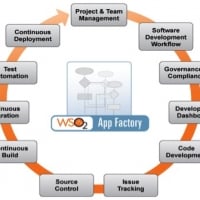Overcome DevOps Adoption Barriers to Accelerate Software Delivery

Responsive IT teams overcome software delivery challenges and deliver projects at the speed of business. They work toward simplifying the development and operational experience and shortening project cycle times. DevOps and platform as a service (PaaS) promises to change IT dynamics and create a more responsive IT environment.
Every team can improve its delivery speed. Teams usually face long lead times before project delivery, expensive solution price tags, and uneven policy compliance. DevOps proponents position principles and practices as the solution.
Barriers to DevOps Improvement
Adopting DevOps principles and practices is not easy. Common barriers include overcoming fragmented collaboration practices, discarding outdated IT infrastructure, and replacing previously manual and calcified processes with automated and streamlined pipelines. Without a preintegrated DevOps environment, teams often work for months building an effective tool chain. The DevOps tool chain environment is usually compatible with only a single project template, single run-time environment, or single team. Scaling DevOps requires establishing an environment that can be adopted across multiple project teams and runtimes.
The Path to Responsive IT = DevOps and PaaS
The path to responsive IT requires moving away from traditional application platforms, team structure, and information flows. Responsive IT teams reinvent the application platform and reshape solution delivery. Their architecture intelligently incorporates cloud platforms and DevOps.
Reinvent the application platform
A DevOps-oriented application platform unifies DevOps practices, agile delivery, and PaaS to deliver a consistent, automated, governed, and unified application development lifecycle.
The platform should automate governance and enforce policies. Cloud provisioning should fulfill deployment requirements across all service providers and technologies used by delivery teams. The platform delivers on-demand self-service access across a standard IT and business service catalogue.
The platform should help teams enforce compliance and best practices. For example, governance stakeholders may configure an approval process that includes review gates, approval checklist items, and automated test execution. Because the platform automatically provisions design-time and run-time assets, teams can rapidly deploy projects into a pre-certified run-time environment that ensures use of approved frameworks and services.
Teams reshape development and operations with DevOps
DevOps principles reshape activities to become iterative, incremental, continuous, automated, self-service, and collaborative. Responsive teams adopt DevOps practices of self-service configuration, automated provisioning, continuous build, continuous integration, continuous delivery, automated release management, and incremental testing. Figure 1 illustrates how teams are thinking holistically about the entire application lifecycle, and integrate stand-alone activities into an orchestrated, iterative cycle.

Figure 1. The Full DevOps Lifecycle
Launch Pad
Responsive IT teams rapidly deliver high-quality software. Unfortunately, most IT teams do not have an environment fostering the rapid iteration, streamlined workflow, and effective collaboration required to operate at the speed of now and capture business opportunity.
Disconnected tooling, static environment deployment, and heavyweight governance often impede rapid software cycles, minimize delivery visibility, and prohibit innovative experimentation.
A new, more responsive model is required. When teams increase agility and reduce time to market by adopting agile software development practices, DevOps principles, and cloud self-service platforms, they choose a development and operations environment that accelerates software delivery.
Chris will lead the session Overcome DevOps Adoption Barriers to Accelerate Software Delivery at DevOps Conference West.

